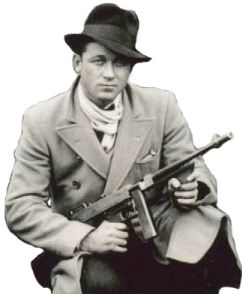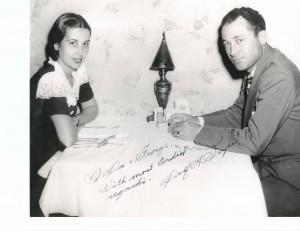Today we have the second in a two-part guest post by Holmes, who blogs with Piper Bayard over at Author Piper Bayard‘s site. Holmes’ specialties are history, crime, war, and international intrigue. Here he finishes his account of real-life detective Jelly Bryce, a crack marksman who found his skills were very much needed in the 1920s and 30s gangster era. Enjoy!
Supercop Jelly Bryce, part two: the FBI and after
by Holmes

In 1934, at the Union Station in Kansas City, an FBI agent apparently accidentally killed four of his own agents while attempting to defend them against a sudden ambush with a borrowed shotgun. The agent had apparently never fired a shotgun before. Until then, FBI agents did not routinely carry firearms and had little or no training in their use unless they had learned to handle them from military service, as a personal hobby, or from service in another law enforcement agency. After the aforementioned infamous “Kansas City Massacre” the federal government finally realized that it was ridiculous to expect FBI agents to investigate criminal cases without the benefit of firearms training and decent weapons.
The controversial FBI Director, J Edgar Hoover, had done a good job of cleaning up the lethargic and corrupt FBI by hiring well-educated and talented young attorneys and accountants to raise the level of professionalism in the previously anemic FBI. Hoover realized that the bright and enthusiastic Ivy League agents needed help with “street skills.” The FBI went on a nationwide talent search for the best, experienced police detectives. Delf “Jelly” Bryce and Clarence Hurt were both hired as FBI agents.
Bryce quickly gained the respect of his fellow FBI agents. He developed a reputation for having great instincts and investigative skills. Although he was a brilliant investigator, he is remembered in the FBI as a remarkable “quick draw” shooter.
Bryce was routinely asked to demonstrate various shooting skills to new or visiting agents, and he developed a remarkable reputation for trick shooting. He would routinely toss a coin into the air, then draw whatever pistol he happened to be carrying and shoot the coin out of the air. He was considered to be the FBI’s best trick shooter, even though he remained a field agent rather than serve on an FBI shooting demonstration team.
Young agents who served under Bryce when he was FBI Special Agent in Charge of Oklahoma remember him with affection. Not for his remarkable shooting skills, but for his courage and integrity. They recall him as a man who never harmed a suspect or prisoner unnecessarily and always respected the law.
In spite of his fame in the law enforcement community, he had a reputation as a very humble and friendly person. Bryce was reticent about discussing how many criminals he had shot, but FBI agents of his era calculated that he had killed nineteen wanted criminals during his career. He also had a reputation for always taking the most dangerous position in any raid on known violent criminals, even when he was close to retirement.
Bryce retired from the FBI in 1958, and, after failing in an election bid for governor of Oklahoma on an independent ticket, he settled down with his wife, Shirley, to a quiet life of hunting and fishing.

In 1973, Shirley died of complications from injuries that she had suffered in a car accident. Bryce’s friends said that he was never the same after he lost her.
In 1974, Jelly Bryce was attending a reunion of retired FBI agents and excused himself early after dinner because he felt exceptionally tired. He went up to his room and died in his sleep of a heart attack.
Most of the supercops who we see in films and TV shows are just too bland and unskilled when compared to Jelly Bryce. In this case, truth was, indeed, stranger than fiction.
Holmes, this was a fascinating account of Jelly Bryce. What an interesting figure from our history. We could certainly use more like him in our time. Thank you for sharing this with us, and to Piper, for sharing part of her team!
What do you think of Jelly Bryce? Was he a unique creation of his time, or could we have another like him now? I’d love to hear from you.
Until next time,
Kathy



Incredible article, Holmes! Thanks for sharing this incredible story with us.
Thank You Gene.
What a fascinating life and I loved seeing the photos too. Seems like he was one of those exceptional people no one realized was so exceptional until he was gone. It’d be quite the honor to have worked under him. Trick shots and all.
Hi Jess. Thanks for stopping by. I think that his contemporary FBI Agents and the bureau leadership understood that he was a unique and highly talented individual. His life in the bureau was almost that of “senior sword instructor” in an eighteenth century Japanese fiefdom. He was not expected to waste his time on routine matters. Wisely, the bureau didn’t care that he spent half his time fishing. When a real problem arose he showed up and lead the way.
How very interesting. I’d never heard of Jelly Bryce before, so that’s exciting to learn something new. Also, I love reading about larger than life people. Life’s too crazy not to have a few larger than life characters. 😀
You are so right, Catie! So glad you stopped by.
Hi Catie. He was an amazing fellow.
Very cool – loved the post and the photos – thanks for sharing 🙂
Isn’t it great what photos are available? Thanks for your comment!
I am so glad there was a Part 2 to Jelly’s story – thank you for hosting Bayard & Holmes, Kathy! I find this story absolutely fabOoolous!
Why, thank you, Tiffany! Nice to see how his story turned out. I’m indebted to the talented Holmes and Bayard for agreeing to guest blog!
Thank you Tiffany. I am glad that you enjoyed the story. I like people like Bryce. They require no writing talent. They write their own great story.